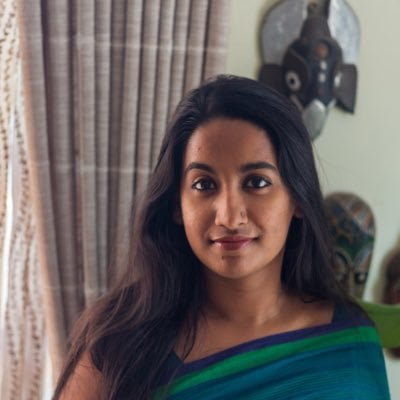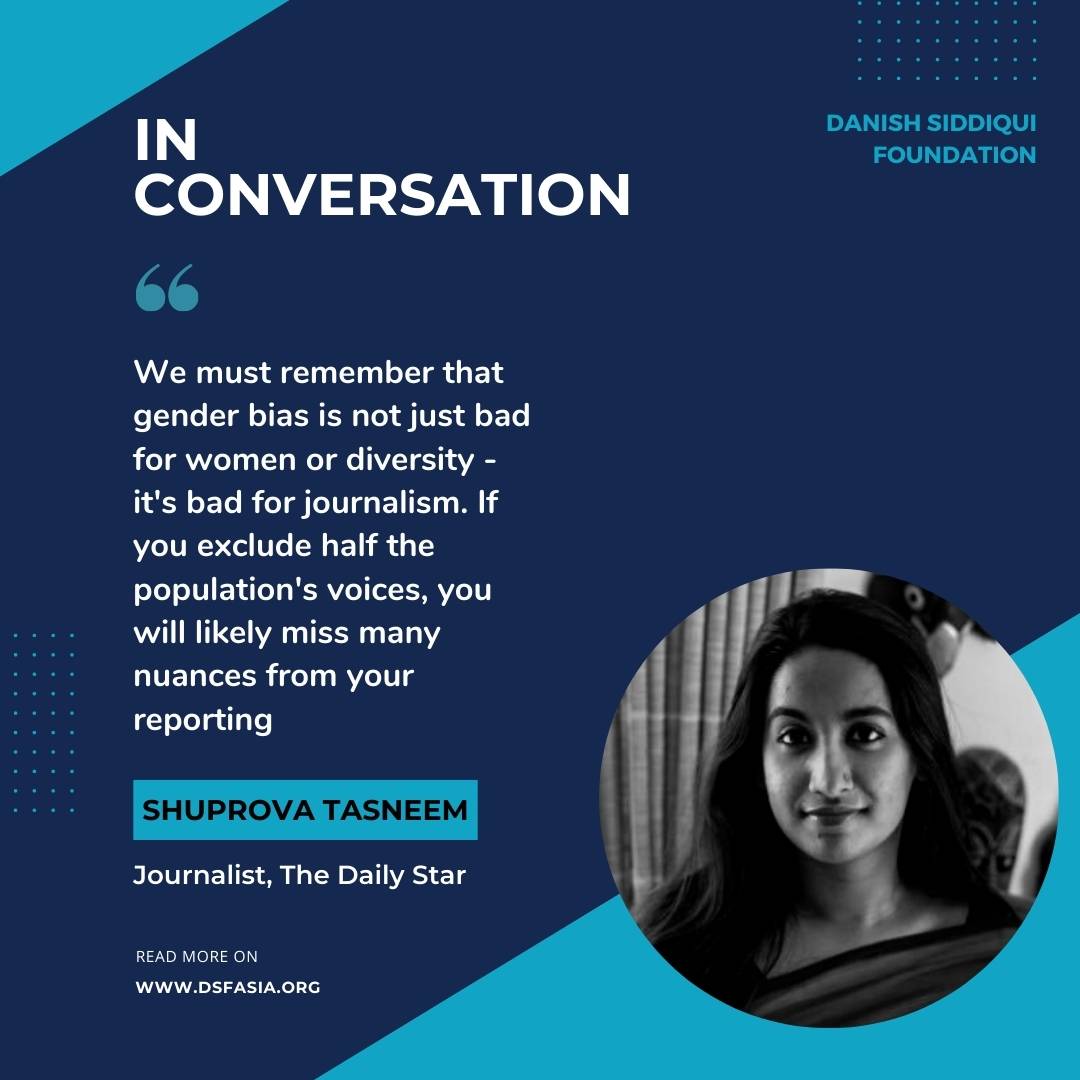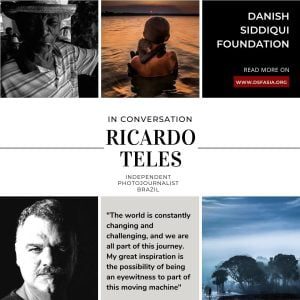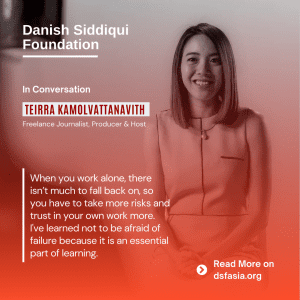
What inspired you to become a journalist?
I think it would be more accurate to say that journalism inspired me. I always knew I wanted to write, and as I grew older, I realized there were issues I deeply cared for and wanted to learn more about. It seemed only a natural progression to go on to journalism from there. And it continues to inspire me every day in so many ways: by being a learning experience, by making me think about the world around me, by introducing me to people, places, and experiences that I otherwise might not have across in another line of work, and by making me feel like I’m a part of a greater whole that puts something meaningful out into the world.
You’ve been writing about gender justice, human rights, and inequality. What have you learned from your experience covering these issues?
This might sound contradictory, but I’ve learned that we still have a long, long way to go and that we shouldn’t lose hope. When writing on the topics you mentioned, it can sometimes be devastating when you start to think about how many people in the world are being marginalized and oppressed in different ways, whether it’s informal workers or Indigenous communities. But at the same time, you meet so many people who, on the face of it, have so little “power” but are working so hard to raise their voices and fight for a better, more just society that you have to believe that they are the ones with the real power who will bring change.
Do you think female journalists face more challenges than male journalists? If yes, what are the challenges?
Absolutely. According to the 2020 Global Media Monitoring Project (GMMP), it will take another 67 years to close the gender gap in global media, and this is very disheartening to hear in this day and age. The challenges start from the beginning since the media is a very male-dominated industry, and there are serious barriers to entry for women. There are still a lot of stereotypes, such as women not being able to work unsociable hours or not being able to report on male-coded topics like sports and finance. Still, there’s also resistance from within organizations to take representation more seriously.
Research shows that women as subjects, sources, and experts are also chronically underrepresented in news reports. You’re far less likely to see women as leaders in media organizations, especially newsrooms. But instead of finding ways to improve representation, for example, by putting daycare centers in offices so that journalists who become mothers can continue working, we often exclude women altogether. The challenge is to incorrect the gender imbalance within media organizations. With more female leadership and female journalists, gender gaps in news reports are also more likely to be resolved.
What should media and journalists do to tackle gender bias issues?
It’s important to remember that gender bias is at every level: leadership, editors, reporters, and within the news reports themselves. And within the reports, the bias is not just when we frame reports in a way that is gender-insensitive or disrespectful to women, but in terms of erasing women from within news reports altogether. We all live in patriarchal societies, including journalists, and we are all men and women, shaped and influenced by patriarchal norms in ways that we don’t realize. The important thing is to take conscious steps to rectify that – through gender-sensitivity training, gender-equal recruitment processes, and a written organizational policy that makes representation, diversity, and gender-sensitive news judgment central goals of every media house.
We must remember that gender bias is not just bad for women or diversity – it’s bad for journalism. If you exclude half the population’s voices, you will likely miss many nuances from your reporting.
How has gender diversity been in Bangladesh’s newsrooms in recent years?
Things are better than they used to be, but it is nowhere near perfect. Even though there are more and more female journalists, you will still see most media organizations dominated by men. Things are better in TV media, but again that is quite often for the gendered reason that news presenters are often female. For example, GMMP data shows that 74% of TV presenters are women in Bangladesh, but only 11% of reporters are women. I believe it is especially bad in print media, where even the news organizations with “better” representation still have women as only around 10% of the organization.
There are more senior female journalists in the industry, but certain beats and specializations, such as photojournalism or videojournalism, still have little representation. What is equally concerning is that there are only a handful of newsroom leaders or department heads, regardless of which organization you’re talking about. There are still organizations where that number is zero.
Tell us about your project covering gender-based violence in Bangladesh, which you did as a fellow at the Reuters Institute, Oxford University. What is it about?
I looked at three key cases of sexual violence in Bangladesh in 2020 that sparked major protests, and I did a content analysis of related reports in four Bangladeshi newspapers. The goal was to find out how these reports did in terms of eight markers that I came up with based on existing literature on trauma-informed and survivor-centered journalism. Some of the things I looked at, for example, were whether the reports included any victim-blaming comments, printed unnecessary details that capitalized on survivors’ trauma for the sake of “juicy” content, failed to include female sources, or used stereotypical language to paint survivors only as victims, with no focus on their resilience.
I then spoke to journalists, editors, media experts, and women’s rights activists to talk about what we got right, what we didn’t, and how we can improve the journalism around gender-based violence and trauma. The findings showed that while some things had changed, there is still much room for improvement. Based on that, I came up with recommendations that I hope can help any media organization that wants to engage with more gender-sensitive journalism and develop a guideline or organizational policy to work towards that end.
Why is opinion journalism important?
For me, it provides insight into and analysis of different issues, bringing together various strands of convoluted/complicated topics and breaking them down in ways that are accessible to readers. For example, after what happened in Sri Lanka, there is currently a lot of reporting in Bangladesh on foreign exchange reserves, current account balances, IMF loans, etc. These are topics that can go over anyone’s head. Still, a columnist can present all this in more straightforward, more personalized terms and then perhaps bring in a theme that was not touched upon in the news, such as the important role that Bangladeshi migrant workers play in propping up forex reserves through their remittances.
While a lot of it is current affairs, opinion columns also play an important role in keeping in the public eye topics that may not be part of breaking news but are still essential to continue highlighting, such as how refugee fatigue affects Rohingya refugees in the subcontinent. In the end, the most crucial role it plays is in making you think deeply about a problem, and the potential solutions to it, from the perspective of someone with the expertise to put forth those solutions.
What kind of journalistic conduct should be followed while writing opinion pieces?
Opinion writers can often become very popular through their columns. As we have seen in many countries, those popular opinions can sometimes be toxic, patriarchal, anti-science, and even downright prejudiced. The most important thing that I am looking for when commissioning opinion articles (I work in the editorial section of the Bangladeshi national newspaper, The Daily Star) is for them to be based on facts. If you’re writing about climate change, you should know climate science. If you’re writing about gender justice and human rights, even when drawing from personal experience, you should be able to cite data that gives readers more clarity on the situation you’re explaining. And, of course, writing your opinion does not give you free rein to engage in hate speech or make untrue claims.
Does editorial oversight impact opinion writers’ freedom of speech positively or negatively?
Like any other journalism section, I think having editorial oversight over opinion columns is crucial. A lot of the time, people who cry wolf and claim that their right to free speech is being obstructed are honestly people who can go on social media or even to the competitors of the media organization that rejected/edited your piece and use those platforms to make their voices heard. So how can they claim they don’t have free speech?
Press freedom and freedom of speech are significant issues in our countries. But it is not editorial oversight taking away that freedom. At the same time, it is worrying to see many journalists side with oppressive forces and use their voices to put very questionable opinions out there, which are offensive and can be dangerous to minorities. I feel we need more editorial oversight to guard against such cases, but in these contexts, the editors and publishers are complicit in this hate speech.
What advice would you give young women students and journalists starting their careers?
It’s going to be difficult. You’re going to face many obstacles. You will probably have at least one person in your life ask you to get a more “stable” job, work long hours, and have to fight hard to get the wages you deserve. But you’ll have the opportunity to use your words for something meaningful and ultimately be in a line of work that will make you feel fulfilled. This is the case for all journalists, but it is even more difficult for women trying to break into this industry.
And as much as I wholeheartedly empathize with anyone being negatively impacted by this gender imbalance, the truth is, it will unfortunately still be up to you to fight for your corner. My advice would be to keep pushing against anyone who makes you feel like you don’t deserve to be in the room with them, take up as much space as possible, make yourself heard, and force others to think of the gender bias in media as often as possible.
At the same time, remember nothing is worth sacrificing your mental health for, and it’s really important to create a network of friends and allies to make sure you’re not in it alone.
Disclaimer: The views and opinions expressed by those interviewed by the Danish Siddiqui Foundation, including all program participants, are solely their own current opinions regarding events and are based on their own perspectives and opinions. The views and opinions expressed do not necessarily reflect the views or opinions of the Danish Siddiqui Foundation, or the companies with which any program participants/interviewees are, or maybe, affiliated.




